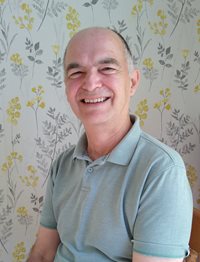Each quarter, our Educational Writers Group (EWG) interviews a different member. Here, we talk to Richard Durant about developing craft, discipline and writing his first novel.
 How did you come to be an educational writer?
How did you come to be an educational writer?
When Teachit began in 1999 I thought it was a wonderful resource for us teachers – lesson plans and classroom resources shared by teachers and put online for all. I contributed a few, and then when I became a consultant in the KS3 Strategy I had to develop a lot of resources quickly, and Teachit – which had just turned professional – was the best place to make them available to all. Then Pearson suddenly needed a new writer for their Heinemann Shakespeare series. On the strength of my contributions to Teachit I was recommended for Heinemann Shakespeare, and I never looked back.
Over the last twenty years I’ve written or co-written over 60 books for Pearson, Collins, Scholastic, and many other publishers, as well as numerous articles for education magazines.
What do you think are the necessary skills for working in this sector?
Clarity and precision. I edit as well and I insist on short words and short sentences: no waste. In this sector the word count is crucial – as are deadlines. You need to be very self-disciplined and able to deliver bang on time. You also need to not be precious about your writing. When I started out, I wrote textbooks as though they were novels. I was protective over every word. My first editor finally confronted me: you are not an artist; you are a hack. The sooner you accept that the better. He was right, and – to my occasional chagrin – every editor I have worked with since has turned out to be right. I now stick to my professional co-writer’s motto of ‘do it quick and dirty’. It’s very liberating. I’ve just completed my first novel, and the discipline I learned from education writing has helped me keep my novel clean and lean.
Tell us about your typical working day.
I’ve never been a full-time writer. Writing is something I have had to squeeze into a full working day. The best advice I ever received was from another prolific education writer. I asked him once how he ever found time to write so much. He told me that he set aside an hour a day for writing. It wasn’t the same hour every day, but every day he identified the next day’s hour of writing and he stuck to his plan. “If you genuinely write for one hour a day (and don’t just intend to), it’s astonishing how much you can get done,” he told me. He was right. I took his advice, and soon found I was writing a lot more than anyone else I knew. It works.
What do you enjoy most about your work?
I enjoy working to the spec given by the publisher, tailoring language and content to the spec. It’s not really creative, not freely creative anyway, but it gives me pride in my developing craftsmanship. I imagine a clockmaker would gain the same sort of satisfaction in a job well done.
Do you have any advice for those starting out in educational writing?
I suppose there’s a lot of advice that I’ve taken and described above. I’d pass that on. I’d also say: be politely assertive with publishers. I’ve always insisted on writing for an advance and royalties, and publishers’ refusal to offer that method of payment or their refusal to pay the rate I want has meant that I have often walked away from negotiations. In almost all cases, the publisher has contacted me later and agreed to the terms I have requested. You do have to compromise, of course, but it’s worth knowing what you want and what you are prepared to accept. Whatever you do, don’t start work until terms have been agreed (and contact the Society of Authors to look over these terms). Many publishers will try to string you along until you are too committed to the project to walk away. Good luck!
Richard Durant is a widely-published author of text books, revision materials and educational articles. For ten years he was English Adviser for Devon and before - and after - that he was a secondary English teacher, including two stints as Head of English.